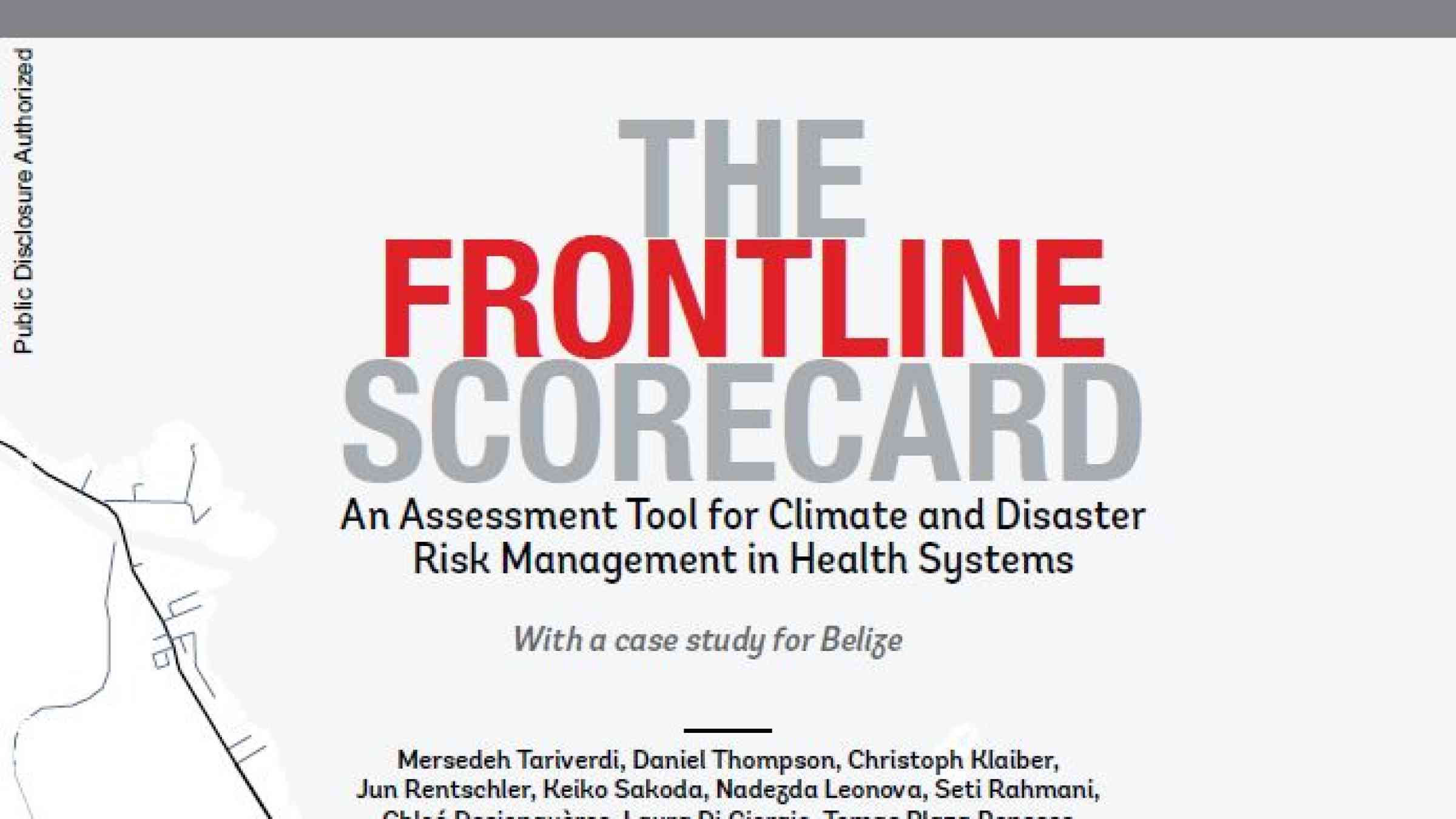The Frontline Scorecard – Diagnosing the disaster resilience of health systems

- A new report by the Global Facility for Disaster Reduction and Recovery (GFDRR) presents a tool for conducting an initial broad-based assessment of the resilience of a country’s health system to disasters and climate change.
- Disaster resilience not only depends on the robustness of the health system, but also on its seamless integration with a country’s emergency management and infrastructure systems.
- Operational examples, notably from Belize, demonstrate how the Scorecard can guide the direction for more in-depth technical assistance, and thus help with identifying and prioritizing concrete actions for building resilience.
Frequent natural shocks, exacerbated by climate change, pose profound challenges for health systems, and the health systems’ ability to provide reliable care. Belize, a small coastal country in Central America, is at the forefront of such risks. In 2022, Category 2 Hurricane Lisa forced many private health practices to shut down in Belize City, increasing demand for services from the public and private-public sectors. Most patients were moved to Karl Heusner Memorial Hospital (KHMH) in Belize City, which is the country’s only tertiary health facility, putting additional strain on already scarce resources. The risks may intensify in the coming years: KHMH itself is not designed to withstand hurricanes stronger than Category 2. Belize City, entirely below sea level, faces a heightened flood risk, and KHMH is situated in a particularly vulnerable flood zone.
The World Bank collaborates with countries to strengthen the resilience of health systems against climate change and disasters. GFDRR’s thematic area on Climate and Disaster Risk Management for Health Systems supports these efforts through technical assistance such as the Frontline report which sets out five priority areas that are essential for disaster preparedness of health systems:
- Foundations: Strengthening the capacity of health systems to manage routine demands is a prerequisite for increasing their resilience to shocks.
- Health care facilities: It is imperative that facilities are equipped to handle surge in demand during emergencies and protected against shocks, such as earthquakes or floods.
- Health care systems: The coordination of regional and system-level responses, along with the implementation of flexible solutions are key during emergencies.
- National emergency management: The health sector’s crisis response should be synchronized with emergency management systems, including civil protection and risk financing.
- Quality infrastructure: Resilient water, electricity, transport, and digital infrastructure are indispensable for the delivery of effective health services.
The recently published Frontline Scorecard report for disaster resilient health systems converts the report’s principles into a data-driven, country-specific gap analysis to identify major risks and potential areas for action. Targeting low- and middle-income countries, the scorecard serves as an initial step towards pinpointing and prioritizing investments, reforms, and topics for further examination. To achieve this, the Frontline Scorecard evaluates over 80 distinct indicators across the different priority areas to identify pressing gaps and opportunities for improvement. These indicators are evaluated using data from multinational institutions—including the World Bank, the World Health Organization (WHO), and Organization for Economic Cooperation and Development (OECD)— as well as national public reports, and other reputable sources in health, disaster risk reduction, emergency response, and infrastructure.
The newly released Frontline Scorecard report introduces its methodological foundations and showcases its application in Belize, demonstrating how health system planners and disaster risk management agencies can build on its insights to identify areas to strengthen resilience and disaster risk management. The operational benefits of the Scorecard —such as speed, reliability, flexibility, and broad applicability— are highlighted by its ability to provide rapid insights, thanks to its development from reliable sources and capability for customization.
This scorecard approach has already been piloted in several countries, including Peru, Colombia and Belize, to identify priority actions for building health system resilience. The case study of Belize, detailed in the new Frontline Scorecard report, illustrates how this assessment can guide the focus of more in-depth technical assistance – and thus inform decisions on the allocation of resources to critical elements of a health system’s disaster preparedness strategy. The analysis involved a structured review of data and policy documents, complemented by on-site visits and consultations with experts. The key findings highlight the urgent needs for routine maintenance of health facilities, enhancing supply chain and storage systems, nationwide standardization and implementation of emergency protocols, and the establishment of uniform standards and procedures for medical staff.
Through these efforts, GFDRR supports World Bank teams and partner governments in uncovering opportunities to build resilience, marking a crucial first step towards policy adaptation and investments in shock-resilient health systems.